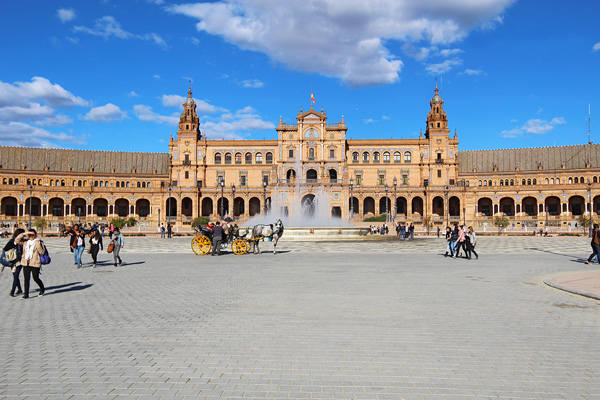Retire in Seville Guide
Summary: Retire in Seville with confidence, armed with the knowledge from our extensive guide. It covers critical considerations for retirees, from the cost of living and climate to housing, healthcare, and residency choices in Seville. We also delve into the social and cultural scene, volunteering options, public transportation facilities, and the city's walkability, helping you make an informed decision.

Seville is a popular destination for international retirees due to its rich history, vibrant culture, and warm climate. The city offers a high quality of life, with affordable living costs, excellent healthcare, and a plethora of recreational activities. However, retiring in a foreign country also presents challenges, such as language barriers and adapting to a new culture. This article will delve into the various aspects of retiring in Seville, from the cost of living to the local lifestyle.
Living Expenses in Seville
Seville is one of the most affordable cities in Spain, making it an attractive option for retirees. The cost of living is significantly lower than in many European and North American cities. Rent for a one-bedroom apartment in the city center is around €600-€800 per month, while eating out at a local restaurant can cost as little as €10. Groceries are also reasonably priced, with fresh produce available at local markets.
Seville's Climate
Seville boasts a Mediterranean climate, with hot summers and mild winters. The city enjoys over 300 days of sunshine per year, making it an ideal location for those who love outdoor activities. However, the summer heat can be intense, with temperatures often exceeding 40°C (104°F). Therefore, it's essential to stay hydrated and avoid the midday sun.
Healthcare Facilities
Spain's healthcare system is ranked among the best in the world, and Seville is home to several top-notch hospitals and clinics. The city's healthcare facilities offer a wide range of services, from routine check-ups to specialized treatments. Many doctors and nurses speak English, making it easier for international retirees to communicate their health concerns.
Public Healthcare System
Spain's public healthcare system is accessible to all residents, including international retirees. However, many retirees opt for private health insurance to avoid long waiting times for non-emergency procedures. It's also worth noting that some medications that are over-the-counter in other countries may require a prescription in Spain.
Residency Options
Spain offers several residency options for retirees, including the non-lucrative visa, which allows foreigners to live in Spain without working. To qualify, applicants must prove they have sufficient financial resources to support themselves and have full health insurance coverage.
Recreational Activities and Restaurants
Seville offers a wealth of recreational activities, from exploring historic sites like the Alcazar and the Cathedral to enjoying flamenco shows. The city is also known for its culinary scene, with restaurants like El Rinconcillo and La Brunilda offering traditional Andalusian cuisine at reasonable prices.
Language Learning Opportunities
While many locals speak English, learning Spanish can enrich your experience in Seville. Several language schools, such as CLIC International House and Enforex, offer Spanish courses for all levels.
Local Lifestyle and Markets
Sevillanos are known for their friendly and welcoming nature. The city has a relaxed pace of life, with siestas still a common practice. Seville also hosts several markets, such as the Mercado de Triana, where locals and tourists alike can buy fresh produce, meats, and cheeses.
Meeting People and Volunteering
Joining local clubs and organizations is a great way to meet people and integrate into the local community. Volunteering can also be a rewarding experience. Organizations like the Red Cross and Caritas offer various volunteering opportunities.
Housing and Neighborhoods
Most retirees in Seville live in apartments, with popular neighborhoods including Triana, Los Remedios, and Santa Cruz. These areas offer a mix of traditional and modern housing options, with easy access to amenities and public transportation.
Transportation in Seville
Seville has an efficient public transportation system, including buses, trams, and a metro. The city is also very walkable, with many attractions within walking distance. Therefore, owning a car is not necessary for most retirees.
Retiring in Seville offers a unique blend of culture, history, and lifestyle. While there are challenges to overcome, the rewards of living in this vibrant city are well worth it.
About the Author
 Betsy Burlingame is the Founder and President of Expat Exchange and is one of the Founders of Digital Nomad Exchange. She launched Expat Exchange in 1997 as her Master's thesis project at NYU. Prior to Expat Exchange, Betsy worked at AT&T in International
and Mass Market Marketing. She graduated from Ohio Wesleyan University
with a BA in International Business and German.
Betsy Burlingame is the Founder and President of Expat Exchange and is one of the Founders of Digital Nomad Exchange. She launched Expat Exchange in 1997 as her Master's thesis project at NYU. Prior to Expat Exchange, Betsy worked at AT&T in International
and Mass Market Marketing. She graduated from Ohio Wesleyan University
with a BA in International Business and German.
Some of Betsy's articles include 12 Best Places to Live in Portugal, 7 Best Places to Live in Panama and 12 Things to Know Before Moving to the Dominican Republic. Betsy loves to travel and spend time with her family. Connect with Betsy on LinkedIn.
Additional Information:
- Best Bookstores and Libraries in Seville
- Fun Classes for Expats Living in Seville
- Public Transportation in Seville
- Best Markets in Seville
- Retire in Seville Guide
- 7 Tips for Living in Seville
- Pros & Cons of Living in Seville
- Health Care in Seville
- Discovering the Best of Seville
- Cost of Living in Seville
- Healthcare & Health Insurance in Spain
- Best Places to Live in Spain
- Real Estate in Spain
- 10 Best Places to Live on the Coast in Spain
- Pros and Cons of Living in Spain 2025
- 2025 Guide to Moving to Spain




